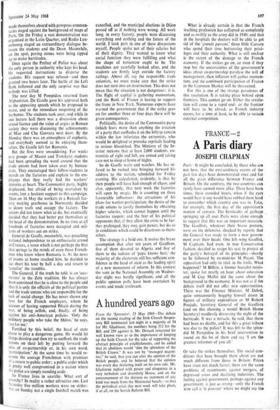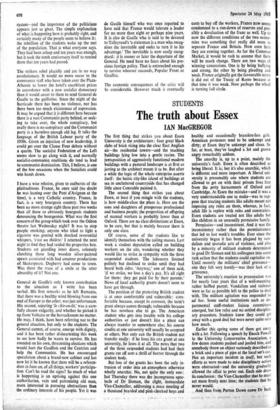A Paris diary
FRANCE - 2 JOSEPH CHAPMAN
Paris—it might be concluded, by those who are not here, that the extraordinary events of the past few days have demonstrated once and for all the great difference between France and Britain. On the contrary, the two countries can rarely have seemed more alike. There have been times, these crowded hours, when if the eyes would bear it one would have rubbed them hard to remember which country one was in. Take, for example, the first day of the opposition's motion of censure. The barricades of garbage springing up all over Paris were alone enough to suggest that this was an important occasion. The Gaullists, whatever their brave posture, were on the defensive, shocked by reports that the General was ready to form a new govern- ment over their heads. One left wing Gaullist, M Capitant, had even, in true Conservative fashion, decided to resign his seat in protest at the party's betrayal of its principles—shortly to be followed by ex-minister M Pizani. The opposition had only to stick in the knife. What happened? M Billere, a former Socialist minis- ter, spoke for nearly an hour about education and M Guy Mollet did the same about the background to the economy. It was not as if the debate itself did not offer new opportunities. There was the Finance Minister, M Debre, quite unnecessarily bogging himself down in figures of military expenditure or M Robert Poujade, Secretary General of the Gaullists (and on this showing a model British Home Secretary) needlessly discussing the night of the barricade. It was a miracle, he .said, that there had been no deaths, and for this a great tribute was due to the police! It was left to the splen- did M Pompidou in his brief intervention to round on the lot of them and say 'I am the greatest reformer of you all.'
Or take the strikes themselves. The social con- ditions that have brought them about are not much different from those in Britain. Prices have risen not much faster; there are the same problems of resentments against mergers, of depressed areas and declining industries. The feeling against government, perhaps against any government, is just as strong—only the French now call it 'le pouvoir' where we might say the system—and the impotence of the politicians appears just as great. The simple explanation of what is happening here is probably right, and certainly many of the people seem to believe it:, the rebellion of the students woke up the rest of the population. That is what everyone says. They had been asleep and ten years was enough, but it took the tenth anniversary itself to remind them that ten years had passed.
The strikers rebel placidly and are in no way revolutionary. It would no more occur to the communist staff who have taken over the Plaza- Athende to lower the hotel's exorbitant prices in accordance with a new socialist democracy than it would occur to them to send General de Gaulle to the guillotine. Since the night of the barricade there has been no violence, nor has there been too much viciousness of expression. It may be argued that it is different here because there is a vast Communist party behind, or seek- ing to take over, the whole conspiracy, but really there is no conspiracy and the Communist party is a harmless enough old lag. It talks the language of the British Labour party of the 1930s. Given an injection of new leadership, it could get over the Clause Four debate without a qualm. The socialist Federation of the Left seems slow to go along with it, and normally socialist-communist coalitions do tend to lead to communist domination. This, I believe, is one of the few occasions when the Socialists could win hands down.
I have a wise relative, given to outbursts of the platitudinous. France, he once said (no doubt he was leaning over the Pont d'Avignon at the time), is a very Catholic country. France, in fact, is a very bourgeois country. There has been no more strange sight these past two weeks than all those so obviously bourgeois students denouncing the bourgeoisie. What was the first concern of the group which took over the Od6on theatre last Wednesday night? It was to stop people smoking; anyone who tried to light a cigarette was greeted with shocked reverential whispers, 'c'est un the iitre.' I returned the next night to find they had raided the properties box. Students sat guarding inner doors, solemnly clutching those long wooden silver-painted spears associated with bad amateur productions of Shakespeare. Dogberry had come to town. Was there the trace of a smile at the utter absurdity of it? Not one.
General de Gaulle's only known contribution to the situation as I write has been verbal. His first remarks as he left Rumania, that there was a healthy wind blowing from one end of Europe to the other, was just unfortunate. His second, rejecting 'le chie-en-lit,' was a care- fully chosen vulgarity, and whether he picked it up from Voltaire or the barrackroom no matter. He may, I think, have been referring not to the general situation, but only to the students. The General cannot, of course, emerge with dignity, and it has been rather disheartening this week to see how badly he wants to survive. He has rounded on his own, threatening elections which would hurt the Gaullists and the Centrists and help the Communists. He has encouraged speculation about a brand-new cabinet and has now let it be known that there will be a referen- dum in June on, of all things, workers' participa- tion. Can't he read the signs? So much of what is happening is an uprising against this one authoritarian, vain and patronising old man, more interested in pursuing abstractions than the ordinary interests of his people. Yet it was de Gaulle himself who was once reported to have said that France would tolerate a leader for no more than eight or perhaps nine years. It is also de Gaulle who is said to be devoted to Talleyrand's `a statesman is a man who recog- nises the inevitable and seeks to turn it to his advantage.' The inevitable is now easily recog- nised: it is sooner or later the departure of the General. He need have no fears about his pre- cious foreign policy. That is entrenched enough to survive whoever succeeds, Popular Front or Gaullist.
The economic consequences of the crisis will be considerable. However much it eventually
costs to buy off the workers, France now seems condemned to a run-down of reserves and pos- sibly a devaluation of the franc as well. Up to now the different conditions of the two econo- mies was something that really did seem to separate France and Britain. Now even here they are coming together. As for the Common Market, it would be rash to assume that there will be much change. There are two ways of winning concessions. One is by being bullying and strong, the other by being pleading and weak. France originally got the favourable terms it did out of the Treaty of Rome because at that time it was weak. Now perhaps the wheel is turning full circle.







































 Previous page
Previous page